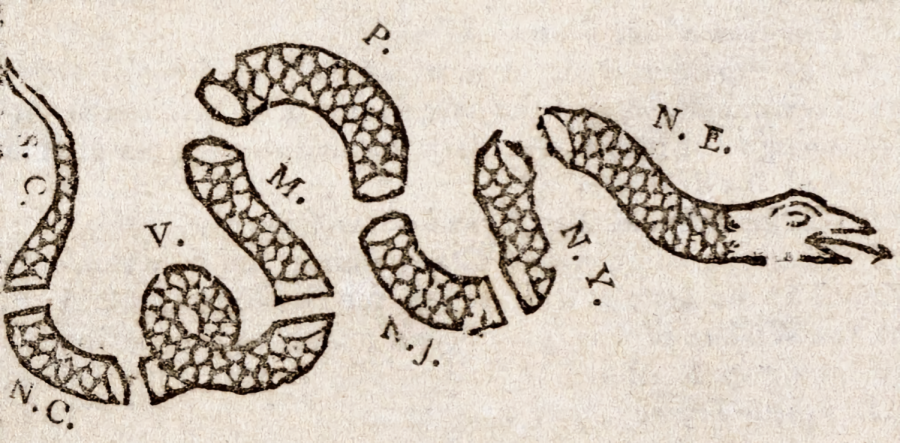Theme of the Month: Traversing the Underbelly
Image of Benjamin Franklin’s “join or die” flag, which was the inspiration for the cover of “Crooked Little Vein”
November 12, 2018
Theme of the Month is an article series designed to investigate the best examples of film, television, and writing that fall under a certain category. These works feature characters that are required to infiltrate the seedier parts of society that are better left alone.
“Crooked Little Vein”
Meet private eye Michael McGill. His detective agency is failing, due to a lack of both charisma and business. When the heroin-addicted Chief of Staff hires him to find a secret “alternate” U.S. Constitution lost by — go figure — Richard Nixon, how can he say no? Thus begins his 300-page trek across the country, along the way encountering several groups that break both legal and ethical laws.
“Crooked Little Vein” is unique in the sense that it is one of the few books that consistently lands its jokes. Each chapter has at least one line that makes the reader laugh, squirm, or recoil in their chair as poor McGill encounters another part of America that society has left in the dumpster.
Speaking of lines, some chapters only have a few of them, showing the sheer confidence author Warren Ellis has in his writing. One of the best examples is when McGill walks into a bar and shouts, “I’m buying a hundred drinks – for me!” and promptly gets beaten to a pulp.
Past the jokes, though, at the core of this novel is a surprisingly bittersweet romance between the lead and a college student he meets — as well as a sharp satire on the melting pot of American culture.
As the Chief of Staff puts it:
“What a crooked little vein you travel.”
“The Treatment”
A family has been discovered chained in their own home. The husband is injured, his wife refuses to cooperate, and their young son is missing. As lead detective Nick Cafmeyer struggles to piece together this bizarre case and a related one from his childhood, another family has been held captive and is running out of time.
This tense Belgian mystery, directed by Hans Herbots and adapted from the novel by author Mo Hayder, delves into territory most American works tend to stay away from. The violence, while not gratuitous, is brutal and the camera doesn’t flinch at some of the more repellent details.
When comparing this film to other captivity thrillers, the differences couldn’t be clearer: gone are the happy endings, PG-13 rating, and black-and-white morals. The world “The Treatment” inhabits is a stark gray, its perpetrators not motiveless baddies but instead deeply disturbed individuals that the viewer can simultaneously despise and pity.
“The Treatment” is currently available to stream for free on the distributor’s official YouTube page. However, given its sensitive topics and graphic nature, viewer discretion is advised.
“Graceland”
Made on a relatively low budget in the Philippines, “Graceland” is writer-director Ron Morales’ second feature.
Family man Marlon Villar ekes out a meager living as the assistant to the corrupt Governor Changho, increasingly unable to support his child, Elvie, and comatose wife. When a political kidnapping is botched and Elvie becomes a hostage, Marlon must sacrifice his moral code if he ever wants to see his daughter again.
The acting doesn’t always work, but when it does, it’s surprisingly effective. Arnold Reyes gives a fine performance as Marlon, whose constant state of crisis he shows very well; Marlon’s boss, Gov. Changho, is played by Menggie Cobarrubias and he also adds more than a few layers to his character.
Much like those of “The Treatment,” the ethics of “Graceland” are far from simple. By the end of the film, everyone will be implicated in a web of deceit and conspiracy. Some characters may have better motives than others, but “Graceland” makes its message clear: nobody is completely innocent.



